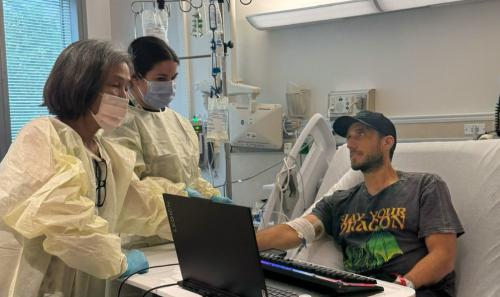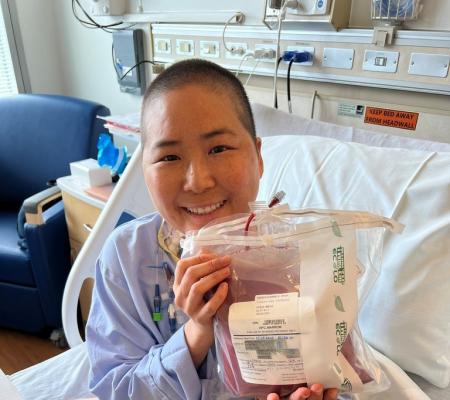
-
Understanding primary immunodeficiency (PI)

Understanding PI
The more you understand about primary immunodeficiency (PI), the better you can live with the disease or support others in your life with PI. Learn more about PI, including the various diagnoses and treatment options.
-
Living with PI
-
Addressing mental health
-
Explaining your diagnosis
- General care
- Get support
- For parents and guardians
-
Managing workplace issues
- Navigating insurance
-
Traveling safely

Living with PI
Living with primary immunodeficiency (PI) can be challenging, but you’re not alone—many people with PI lead full and active lives. With the right support and resources, you can, too.
-
Addressing mental health
-
Get involved

Get involved
Be a hero for those with PI. Change lives by promoting primary immunodeficiency (PI) awareness and taking action in your community through advocacy, donating, volunteering, or fundraising.
-
Advancing research and clinical care
-
Research Grant Program
-
Consulting immunologist
-
Diagnosing PI
-
Getting prior authorization
-
Clinician education
-
Survey research
-
Participating in clinical trials

Advancing research and clinical care
Whether you’re a clinician, researcher, or an individual with primary immunodeficiency (PI), IDF has resources to help you advance the field. Get details on surveys, grants, and clinical trials.
-
Research Grant Program
It was the best of times, it was the worst of times. Paraphrasing this iconic statement is how Carla Dean of Titusville, Florida describes her journey with chronic granulomatous disease (CGD) and her two childhood lives—one at home and one at the National Institutes of Health (NIH).
By 9 years old, Carla had already lost one infant brother (likely to CGD) and suffered stretches of unexplained infections. After years of tests, her family physician referred her to NIH where she finally received a diagnosis of CGD. It was then that they broke the alarming news that she likely wouldn’t live past the age of 18, and certainly not past 30.
“A part of me didn't believe the doctors,” says Carla. “It didn’t make sense, and I was determined to defy the odds and prove them wrong.” As you can imagine, turning 18 and 30 became important milestones in Carla’s life. Now 55, she shared her story with IDF.
Over the next several years, Carla would endure long stays at NIH and five leg surgeries to remove bone infections. Back in the 1970s, Carla’s CGD was treated by cutting out the infections followed by a round of antibiotics. During this period, an older brother with CGD was tossed in a Florida lake when his canoe capsized. Three days later, he was dead from an infection.
“We know now that these bodies of water harbor microorganisms that are specifically dangerous in CGD but the threat was a little unclear back then.”
A period of relative health followed before her liver abscesses returned. Because the doctors felt Carla had had too many surgeries, they began treating her abscesses with antibiotics and catheter drainage under the guidance of ultrasonography. “I spent many childhood birthdays at NIH. The staff became my second family. I remember they would bring to me bunnies from the labs to play with as a special birthday treat,” she adds with a chuckle.
“People say that coming face-to-face with death can really open your eyes to the way to live your life,” explains Carla. “I suppose that is true. It gives you a different perspective.” Carla credits her CGD health challenges with her early development of a deep sense of gratitude for life, as well as feeling more love and compassion towards others. Although the NIH doctor’s momentous words were spoken more than forty years ago, there is virtually no day that goes by that Carla is not aware of making decisions based on them. “Recognizing early on that my time is finite gave me the courage to be true to myself, and to stop postponing my own realizations of what’s truly important in life.”
This past summer, Carla attended one of the special CGD information sessions at the IDF Family Retreats and was able to share her experience and wisdom with some of the younger attendees who are newer to this journey. “This retreat was a game-changer in so many ways,” says Carla. “After dealing with this diagnosis most of my lifetime, I thought I had learned everything there was to know. I was wrong. I learned so much during the IDF retreat, and it opened up a new world of friendships that showed me I was not alone.”
“Yes, I had these two lives as a child. But as an adult, I’ve been able to integrate them,” says Carla. “CGD isn’t a blessing per se, but because of it, I’ve tried to be open to anything—positive or negative—that has come into my life. It gave me this amazing perspective on life and connected me with some truly remarkable people that would not have happened otherwise,” concludes Carla.
Related resources

Man with X-linked hyper IgM first-ever to receive novel gene therapy

Pharmacist with CVID receives bone marrow transplant

Undiagnosed: Reuben & Sherri Johnson on CGD, chronic illness, and the fight for healthcare
Sign up for updates from IDF
Receive news and helpful resources to your cell phone or inbox. You can change or cancel your subscription at any time.





The Immune Deficiency Foundation improves the diagnosis, treatment, and quality of life for every person affected by primary immunodeficiency.
We foster a community that is connected, engaged, and empowered through advocacy, education, and research.
Combined Charity Campaign | CFC# 66309

